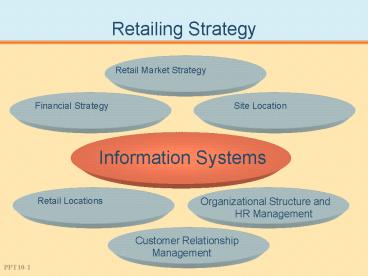Retailing Strategy PowerPoint PPT Presentation
1 / 26
Title: Retailing Strategy
1
Retailing Strategy
Retail Market Strategy
Financial Strategy
Site Location
Information Systems
Retail Locations
Organizational Structure and HR Management
Customer Relationship Management
2
Supply Chain Management
Supply Chain Management is the integration of
business processes from end user through original
suppliers that provides products, services, and
information that add value for customers.
3
What Supply Chain Management Entails
4
Strategic Importance of Supply Chain Management
- Opportunity to Reduce Costs
- Transportation Costs
- Inventory Holding Costs
- Provide Value to Customers by Making the Right
Merchandise is in the Right Place at the Right
Time - Fewer Stockouts
- Greater Assortment with Less Inventory
- Improved ROI
5
Improve Return on Investment
Return on assets Net profit margin x Asset
turnover Net profit Net profit x Net
sales Total assets Net sales Total assets
Efficient Supply Chain Management ? Higher Asset
Turnover
Same Sales Using Less Inventory
6
The Flow of Information and Merchandise
Customer
Sales info
Buyer
Stores
Quick response systems
Distribution center
Vendor
- - - - Merchandise flow
Information flow
7
Information Flows
8
Information Flow
1. When customer makes apurchase, sales
associatescans UPC code on merchandiseand
customer credit card/loyalty card
- 2. Information about purchase is
transmitted from POS terminal to the
buyer/planner. - 3. Information about purchases are
aggregated by buyer/planner and sent to
distribution center and vendor
9
Information Flow
4. Buyer/planner communicates with vendor
and places a purchase order to re-supply
stores.
5. Buyer/planner notifies distribution
center about incoming orders and how they are
to be distributed to stores
- 6. Store managers inform distribution center
about receipt of merchandise and coordinate
deliveries
10
Data Warehousing
Data warehousing is the coordinated and
periodic copying of data from various sources,
both inside and outside the enterprise, into an
environment ready for analytical and
informational processing Wal-Mart makes good
use of its data warehouse. It should. Experts
estimate that it is second in size only to that
of the U.S. government
11
Data Warehouse Structure
12
Electronic Data Interchange
- EDI is the computer-to-computer exchange of
business documents between retailers and vendors - Merchandise sales
- Inventory On Hand
- Orders
- Advanced shipping notices
- Receipt of merchandise
- Invoices for payment
13
Networks for EDI
- Proprietary Systems Network using special
software - Extranet Public internet with access restricted
to partners - Intranet Internet withaccess restricted
topeople within acompany
Easeofaccess
security
14
Physical Flow of Merchandise
Merchandise is sent from vendoreither to the
retailers distributioncenter (1) or directly to
store (3).
Retailer send merchandise from
itsdistribution center to its stores (2).
15
Advantages of Using a Distribution Center
- More cost effective
- More accurate sales forecasts
- Less merchandise in the individual store, thus a
lower inventory investment system-wide. - Less out-of-stock
16
When to Use Distribution Centers
- Unpredictable merchandise sales wide
fluctuations in demand - Frequent replenishment required high number of
units sold per day - Items shipped to store in less than full case
quantities - Many retail outlets that are not concentrated in
one area
17
When to Use Direct Store Delivery
- Retailer has only a few outlets
- Many retail outlets are concentrated in metro
areasyielding increased efficiency of direct
store delivery - Important to get merchandise in store quickly
- Fashion - first to have latest video game
- Merchandise perishable - produce
18
Activities Performed by Distribution Center
- Managing inbound transportation
- Receiving and checking merchandise
- Storing or cross docking merchandise
- Preparing merchandise for the sales floor
- Ticketing and marking
- Putting on hangers
- Shipping merchandise to stores
- Managing outbound transportation
19
Crossdocking
Merchandise flows directly from the vendors
trucks through the retailers distribution center
and is loaded on the trucks going to the
retailers stores without being stored in the
distribution center
20
Logistics Strategy
- PullMerchandise shipped to stores based on
sales and inventory levels in the stores
PushMerchandise shipped to the stores based
on forecasted sales rate
21
Quick Response Delivery System
QR delivery systems are inventory management
systems designed to reduce the retailers lead
time for receiving merchandise, thereby lowering
inventory, improving customer service levels, and
reducing logistics expenses.
22
Benefits of QR Systems
Reduces lead time Increases product
availability and lowers inventory investment
Reduces logistics expenses
23
Costs of QR Systems
Smaller orders - more expensive to transport
Greater order frequency - deliveries and
transportation more difficult to coordinate
Computer hardware and software must be purchased
by both parties.
24
Logistics Support for Electronic Channel
- Requires a different type of distribution center
- Picking and packing individual items sent to
customer vs. - Receiving, storing, and cross docking cartons to
stores - Multi-channel retailers may outsource fulfillment
of Internet orders to third party - Target, Toys R Us ? Target
25
Outsourcing Supply Chain Management Functions
Transportation Warehousing Freight
Forwarders Integrated Third PartLogistics
Services
Control
vs.
Cost
26
Third-Party Logistics Companies
- These firms facilitate the movement of
merchandise from manufacturer to retailer, but
are independently owned. - Transportation
- Warehousing
- Freight forwarders
- Integrated third-party logistics services

